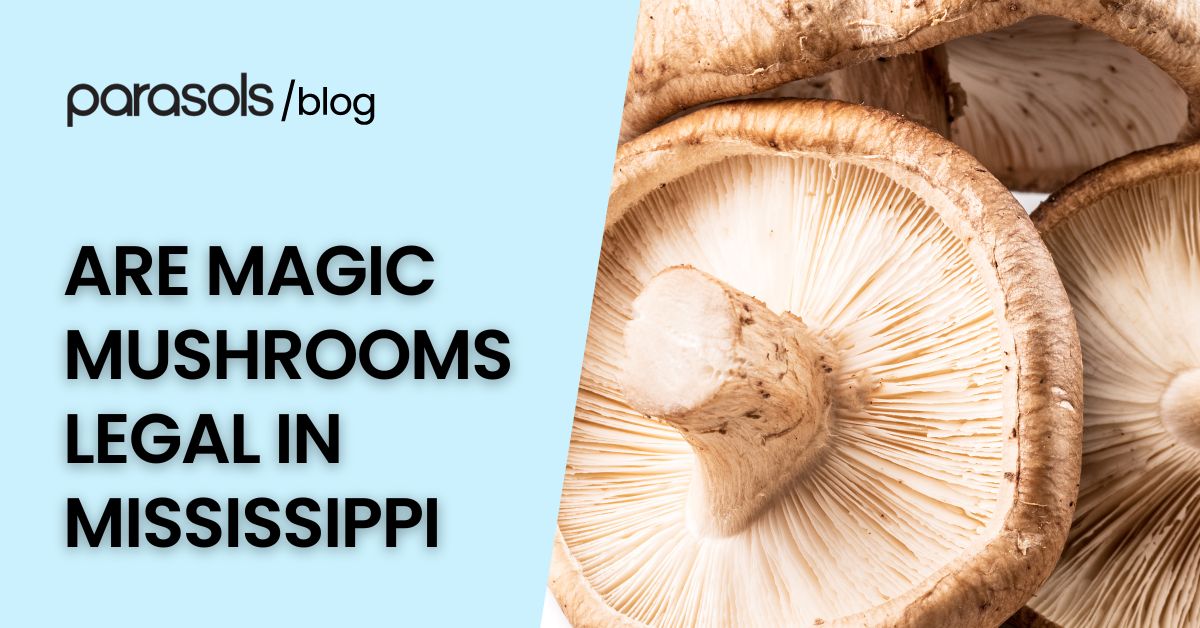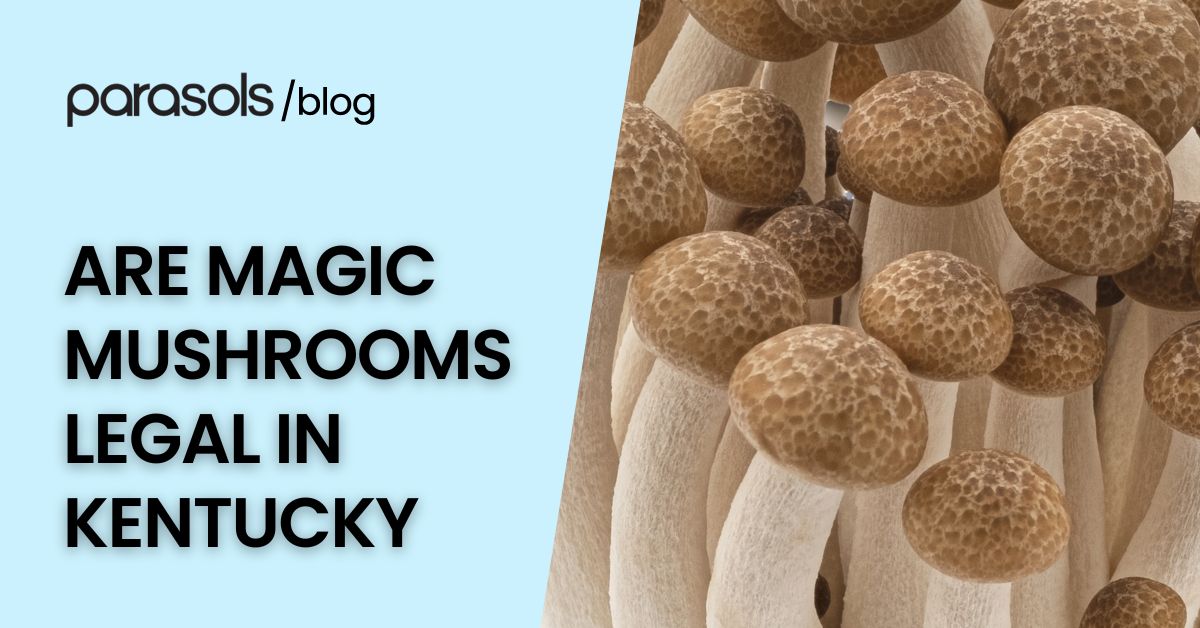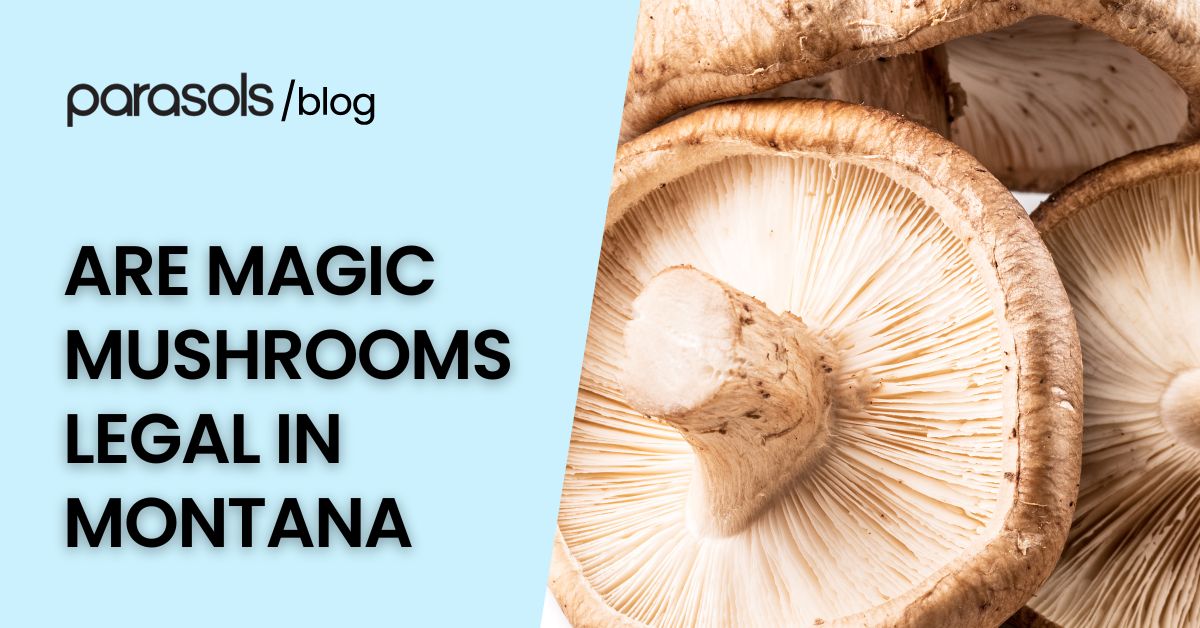In recent years, interest in the therapeutic benefits of psilocybin mushrooms has been growing across the country, especially as more people look for new ways to support mental health and overall well-being. But the legal status of magic mushrooms isn’t the same everywhere—it changes from state to state.
If you live in Mississippi and are curious about psilocybin—whether for personal use, medicinal potential, or simply wanting to understand the conversation—it’s important to know how the law treats these psychedelic substances.
This guide explains the current legal status of psilocybin mushrooms in Mississippi, along with the potential risks and penalties that come with possession or use.
Key Takeaways
- Psilocybin mushrooms are illegal in Mississippi as a Schedule I controlled substance.
- Possession, cultivation, or distribution can result in felony charges with severe penalties.
- No medical, therapeutic, or decriminalization measures exist under state law.
- Mushroom spores may be sold for research, but growing them into psilocybin mushrooms is a crime.
- Mississippi aligns closely with federal drug law and enforces strict penalties for violations.
Overview on Magic Mushrooms
Magic mushrooms, often called psilocybin mushrooms or just shrooms, are a type of fungus that contain a naturally occurring psychedelic substance called psilocybin. When someone takes them, psilocybin changes how the brain’s serotonin works, which can lead to vivid shifts in perception, mood changes, and a different sense of awareness.
People have used these mushrooms for centuries in spiritual and cultural practices. Today, they’re also being studied in clinical research, with early results suggesting possible benefits for mental health conditions like depression, PTSD, and anxiety.
Still, even with this growing interest in psychedelic medicine, the legal status of magic mushrooms is complicated and depends heavily on where you live.
Are Magic Mushrooms Legal in Mississippi?

In Mississippi, psilocybin and psilocin — the active compounds found in magic mushrooms — are classified as Schedule I controlled substances. Under state law, this means they’re considered to have a high potential for abuse and no accepted medical use. Even having a small amount of psilocybin mushrooms is illegal and can bring criminal charges.
Psilocybin mushroom spores are sometimes sold for research or microscopy purposes, but the legal status comes with limits. Growing them into mushrooms or consuming them is against the law in Mississippi and can lead to serious consequences, including criminal charges and prison sentences.
Policies Surrounding Magic Mushrooms in MS
Mississippi enforces some of the strictest drug laws in the country when it comes to psilocybin mushrooms. There are no allowances for therapeutic use, personal possession, or cultivation. The state’s legal status mirrors federal law, meaning penalties can be especially harsh.
Legal Classification and State Statutes
Under Mississippi Code § 41-29-113, psilocybin and psilocin — the active compounds in magic mushrooms — are classified as Schedule I controlled substances. This category is reserved for substances considered to have a high potential for abuse and no accepted medical use. Following federal law, Mississippi prohibits psilocybin entirely.
Enforcement and Regulatory Oversight
The Mississippi Department of Health, along with local law enforcement, is responsible for enforcing mushroom laws. These agencies closely monitor and prosecute offenses related to cultivation, possession, or distribution of psilocybin mushrooms.
Treatment of Spores
Psilocybin mushroom spores don’t contain the active psychedelic substance, which is why they may be sold for research or educational purposes. However, once spores are cultivated into mushrooms containing psilocybin, the act is considered illegal manufacturing and can result in felony charges.
No Legal Exceptions for Medical Use
Mississippi does not currently recognize any medical or therapeutic benefits of psilocybin. Unlike states that are piloting psychedelic therapies or studying medicinal use through research programs, Mississippi law makes no exceptions for medical professionals, researchers, or patients.
Criminal Statutes for Possession and Manufacturing
According to Mississippi Code § 41-29-139, possession, sale, or manufacture of psilocybin is a criminal offense. Penalties depend on the quantity and whether distribution is suspected, but all psilocybin-related crimes are treated as felonies. The state has not adopted decriminalization measures, so even small amounts for personal use remain illegal.
What Happens If You’re Caught Using Shrooms in MS?
In Mississippi, getting caught with magic mushrooms is treated very seriously. Even small amounts can lead to felony charges, and the long-term consequences can reach far beyond fines or jail time. Here’s what that can look like:
- 2–10 grams – Having this amount is considered a felony. It can mean up to 8 years in prison and fines as high as $250,000.
- Under 2 grams – Even tiny amounts are still a felony. Depending on the situation or prior offenses, penalties can include up to 3 years in prison and fines up to $50,000.
- Intent to distribute or grow – If law enforcement believes you planned to sell or cultivate psilocybin mushrooms, the charges get much harsher. This can bring longer prison sentences and much higher fines.
- Mushroom spores – Spores by themselves don’t contain psilocybin, so they aren’t automatically illegal. But the moment they’re used to grow mushrooms, it’s considered manufacturing a controlled substance and can lead to felony charges.
-
Life after a felony – The punishment doesn’t end with court. A felony conviction can affect your ability to find a job, qualify for housing, get financial aid, or even hold certain professional licenses.
Alternatives to Magic Mushrooms in Mississippi
If you’re curious about the potential therapeutic effects of psychedelics but want to avoid the legal risks of psilocybin, there are safer and legal options in Mississippi. These approaches can support mental health and overall well-being without putting you at risk of criminal charges.
- Ketamine therapy – Offered under medical supervision, ketamine-assisted therapy has shown encouraging results for people dealing with depression, PTSD, and anxiety.
- Mindfulness and meditation – Simple practices like guided meditation, breathwork, or mindfulness can help reduce stress and create moments of calm and clarity without the need for any substances.
- Legal herbal supplements – Natural options like ashwagandha, kava, and valerian root are used by some for stress relief and emotional balance.
- Cannabidiol (CBD) – CBD is legal in Mississippi and is often used for its therapeutic potential. Unlike THC or psilocybin, it doesn’t cause psychoactive effects.
- Talk therapy and counseling – Professional counseling and therapy remain some of the most effective and accessible ways to process emotions and find long-term support.
-
Nutritional and lifestyle choices – Sometimes, the basics make the biggest difference. Eating well, exercising, and improving sleep can all play a huge role in mental health and everyday well-being.
Final Thoughts

In Mississippi, the legal status of magic mushrooms remains strict, but curiosity about their therapeutic potential isn’t slowing down. For now, the safest approach is to understand the laws, respect state regulations, and consider legal alternatives that can still support mental health and well-being.
As research continues and public attitudes evolve, staying informed will help you make responsible choices. If you’d like to learn more about safe options and follow updates on psychedelic law in Mississippi, see our full guide on psilocybin and legal alternatives.
Frequently Asked Questions
Are psilocybin mushroom spores legal in Mississippi?
Spores that do not contain psilocybin may be legal to possess for research or microscopy, but cultivating them into mushrooms is illegal and classified as manufacturing a controlled substance.
Is there any movement toward decriminalizing psilocybin in Mississippi?
As of now, there is no active legislation or statewide initiative aimed at decriminalizing or legalizing psilocybin for medical or personal use in Mississippi.
Can I be charged for simple possession even without intent to distribute?
Yes. Mississippi law does not distinguish between personal use and intent in many cases. Simple possession of psilocybin mushrooms is still treated as a felony.
What if I’m caught with mushrooms but claim they’re for personal therapeutic use?
Intent or purpose does not impact legality under current state law. Possession of psilocybin mushrooms for any reason is still a criminal offense.
Do federal laws affect how psilocybin is treated in Mississippi?
Yes. Psilocybin remains a Schedule I controlled substance at the federal level, and Mississippi aligns closely with federal drug classifications in its enforcement.



Leave a comment
This site is protected by hCaptcha and the hCaptcha Privacy Policy and Terms of Service apply.